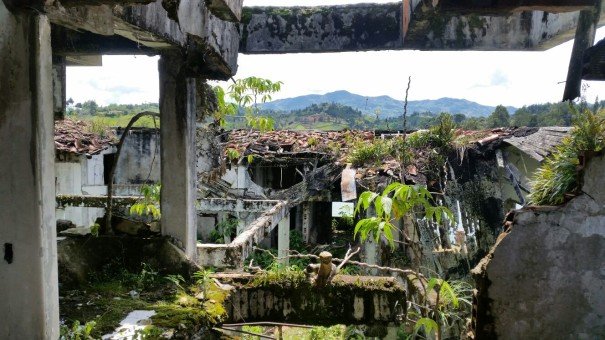
Drinking Cheap Beer in the Ruins of Pablo Escobar’s Summer House

Drinking Cheap Beer in the Ruins of Pablo Escobar’s Summer House
Club Col at La Manuela Hacienda
Burned out graffiti-covered shells of buildings do not normally attract those seeking a cool afternoon beer. There are far more upmarket locations along the rolling green hills surrounding Lake Penol, a few hours drive from the city of Medellín. Nor does the Club Col beer which the smattering of guests are drinking differ from other Colombian bars. However, none has the same pulling power as this small complex jutting out on its own narrow peninsula into the lake. For nowhere else holds the clubhouse of one of the world’s most notorious drug dealers, murderers, and politicians, an extraordinarily wealthy man and philanthropist to many: Pablo Escobar.
La Manuela Hacienda, named after his much-loved daughter, was Pablo’s summer retreat, a place where Colombia’s most infamous son could relax amid friends and family. Built with security in mind, the house is accessible by one long single-track lane, although swift escape was always possible with speedboats, helicopters, and seaplanes ready to spirit the world’s most wanted man away. La Manuela now has just one building in use: Pablo’s clubhouse. The rest of the complex was blown up by a rival cartel in the 1990s and then thoroughly looted after the crime boss’s death in the hope of finding legendary caches of hidden drugs and money. Tropical plants from around the world—Pablo liked to import anything from eucalyptus to bonsai—now weave through holes in the floor, trying to reclaim the house for nature.
The clubhouse’s circular frontage opens out onto the turquoise waters of the lake. Once Pablo’s open-air drinking den, today the sweeping white balcony hosts a different type of clientele, the odd local student and groups of young travellers. Most relax with a Club Col in hand, a watery Colombian beer as forgettable as the location is infamous, whilst Marc Antony tunes with the bass turned up blare out from behind the bar.
The manager, once a young boy working for El Patrón here during his heyday, has seen fridges stocked with Cristal champagne, though rarely drunk by Pablo himself, replaced by rows of $1 beer. Some tourists light up joints on the clubhouse balcony, perhaps ignorant that Pablo’s first foray into the drug world was through the export of cannabis.
Cold Club Cols clutched in hand, they explore the rest of the complex hoping to see glimpses of the life of excess that once played out here. A small football pitch was where Pablo brought some of the country’s best football teams to play for his personal enjoyment, whilst plaster-strewn stables once housed horses for pampered guests.
Today, beers at the clubhouse bookend the main profit-making activity at La Manuela: paintballing. Brightly coloured splodges dot what remains of the walls of Pablo’s home, now host to those seeking the adrenaline rush of wielding guns in camouflage clothes through the relics of what was once a cog in the world’s largest cocaine business, making so much money that $2,500 alone was said to once be spent each month on rubber bands to wrap bundles of cash.
La Manuela may not have the fame of Pablo’s other summer home, Hacienda Napoles, now an amusement park and home to his flourishing community of imported hippos, but it was always his favorite retreat, a place where he hosted the most trusted and loyal. Today the glory days are long gone. Legal wrangles still prevent any decision on the future of the complex. While the bar makes little real money and the beer may be bland and forgettable, Pablo’s clubhouse is still a place for friends and foes of the crime boss, as well as the curious, to come together, remember, and reminisce.